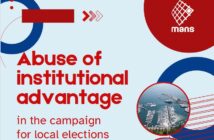Energy is already one of the biggest segments in the economies of South East Europe (SEE) and is set to grow even bigger if the ambitious plans of the region’s governments are realised. The states party to the Energy Community Treaty plan about EUR 28.8 billion in energy investments from 2012 to 2020 in the Western Balkans.¹ Managing these investments will be an existential challenge for the SEE states. Their economies need secure sources of power, and their population needs that power to be clean.
Historically, projects on this scale have often been marked by corruption, which has driven reputable investors away and raised costs. It has also meant reduced opportunities for sustainable energy development, by wasting resources, distorting markets, diverting public interest towards private interests, biasing decision making against rational-sustainability criteria and in favour of vested interests.
Building a modern energy infrastructure must go hand in hand with strengthening the rule of law. Te problem is complex and simple bribery is only a small part. Some forms of corruption are very difficult or impossible to prosecute, or violate no laws. The task is not so much stamping out occasional abuses of public power for private gain, as it is the construction of well-ordered, reliable and transparent governing institutions bound by the rule of law.
Much of what is known about corruption in the energy sector comes from two complementary
sources. Intergovernmental bodies like the Energy Community Secretariat and the European Commission (EC) report on standard setting, while reporters and civil society organisations (CSOs) investigate patronage and corruption. Some of the cases they publicised ended in court. For all involved including the prosecutors and judges, impartiality and independence have been hard-won qualities.
In the fight against energy corruption very often individuals, whether they be journalists, NGO activists, state prosecutors or whistleblowers from within the system, take on the lonely task of seeking justice. They work in a challenging, often hostile environment, vulnerable to official pressure or intimidation and to government abuse of its power to silence inconvenient voices.
Complete publication download HERE (PDF)



